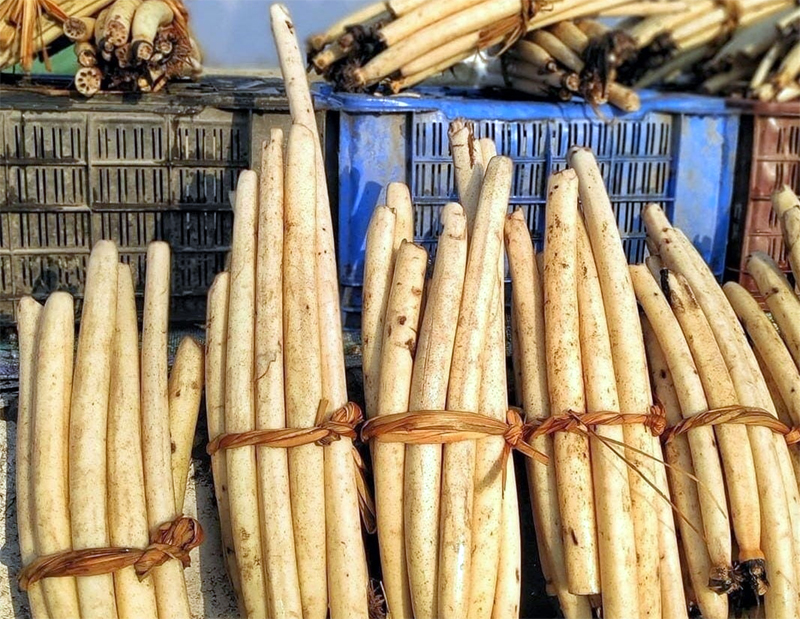Lotus Stem Blooms Again: Wullar Lake’s Restoration Revives Local Economy
By: Javid Amin
The pristine waters of Wullar Lake in Kashmir are no longer a fading memory. After decades of neglect and ecological degradation, the lake is witnessing an extraordinary revival. This resurgence has breathed new life into the local economy by bringing back Nadru—the cherished lotus stem that holds both cultural and economic significance for the region.
Once thought to be lost forever, the return of Nadru is a story of resilience, dedication, and the delicate relationship between humans and nature.
The Disappearance of Nadru
For nearly two decades, Wullar Lake’s ecosystem was choked by pollution, unchecked encroachments, and silt accumulation. As a result, Nadru—the lake’s iconic lotus stem—vanished. The loss was devastating for local communities who depended on Nadru harvesting for their livelihood.
“I remember my father telling us how they would collect Nadru in the early mornings, selling it in the market to make ends meet,” recalls Javid Ahmad, a young man from the Saderkoot area. “But as pollution worsened, the lotus plants stopped growing. We had no choice but to look for other ways to survive.”
With limited employment opportunities in the region, many young men like Javid were left idle, their futures uncertain.
Also Read | Discover Gulmarg, Pahalgam, and Beyond: Kashmir in Winter Like Never Before
The Turning Point: Restoration Efforts by WUCMA
In 2011, the Wullar Conservation and Management Authority (WUCMA) was established to restore the lake’s health. Over the years, WUCMA implemented a series of measures to rejuvenate Wullar Lake:
- Dredging and Desilting: Nearly five square kilometers of the lakebed were cleaned to remove silt and improve water quality.
- Pollution Control: Efforts to reduce waste inflow and combat industrial pollutants were launched.
- Community Awareness: Campaigns encouraged local residents to participate in conservation efforts and take ownership of the lake’s restoration.
- Sustainable Resource Management: Strategies were developed to balance ecological preservation with economic needs.
The Revival of Nadru
Thanks to these efforts, Wullar Lake is experiencing a remarkable transformation. The Saderkoot basin, once barren and lifeless, is now flourishing with lotus plants.
“Nadru’s return is not just an environmental success—it’s a cultural and economic revival,” says WUCMA Project Coordinator Owais Farooq Mir.
The restored water quality and improved sunlight penetration have created the perfect conditions for lotus plants to thrive. This year, the local community has harvested Nadru for the first time in decades, and the results are astounding.
Economic Impact on Local Communities
The revival of Nadru has opened new avenues for economic growth, particularly for unemployed youth. On average, harvesters collect 10–11 kg of lotus stems daily, earning ₹500–600 per day. Each bundle of Nadru fetches ₹200–300 in the market, making it a valuable source of income.
Javid Ahmad, who had been struggling with unemployment, is now hopeful. “This is a blessing. I can finally contribute to my family’s income,” he says.
Also Read | Why Kangris Remain Kashmir’s Go-To Heating Solution This Winter
Bringing Kashmiri Traditions to the Global Stage
The resurgence of Nadru has also piqued the interest of online marketplaces like Kashmir Store and Kashmir Bazar. These platforms are now promoting Nadru and other local Kashmiri delicacies, connecting farmers directly with buyers across India and beyond.
- Kashmir Store offers freshly harvested Nadru with doorstep delivery, ensuring the product reaches consumers while still retaining its authentic flavor.
- Kashmir Bazar highlights the cultural heritage of Kashmiri cuisine, featuring recipes and blogs on how to use Nadru in traditional dishes like Nadru Yakhni (lotus stem in yogurt curry) and Nadru Monje (crispy lotus stem fritters).
Through these platforms, the humble lotus stem is finding its way into modern kitchens, blending tradition with convenience.
Cultural and Ecological Significance
For Kashmiris, Nadru is more than just a crop; it’s a symbol of their heritage. The plant has deep cultural roots, often featured in traditional Kashmiri dishes and celebrated in local festivals. Its return marks not only an economic revival but also a restoration of pride and identity.
The ecological benefits are equally significant. Lotus plants help maintain water quality by oxygenating the lake and providing habitat for aquatic species.
Challenges Ahead
While the revival of Nadru is a success story, challenges remain. Pollution, encroachments, and limited funding continue to threaten the lake’s fragile ecosystem.
Bilal Bhat, a local social activist, warns of the delicate balance required to sustain this recovery. “If we neglect our responsibility, this blessing could disappear again. It’s up to the community to care for the lake.”
Also Read | December in Kashmir: Snow-Capped Peaks and Frozen Lakes Await
Sustainability: The Way Forward
To ensure that Wullar Lake’s revival is long-lasting, WUCMA has laid out a comprehensive plan:
- Training Programs: Teaching farmers sustainable harvesting techniques to prevent overexploitation.
- Eco-Tourism: Promoting the lake as a tourist destination to generate additional income for locals.
- Waste Management: Strengthening pollution control measures and reducing waste inflow into the lake.
- Community Engagement: Encouraging locals to take ownership of conservation efforts.
A Hopeful Future
For villagers like Javid Ahmad and Imtiyaz Dar, the return of Nadru is a beacon of hope. As they wade into the waters each morning, they are reminded of the transformative power of resilience and collective action.
“Nadru has given us a second chance,” says Javid. “We must protect this treasure for future generations.”
Shop Kashmiri Delights Online
Curious to try Nadru or explore other authentic Kashmiri products? Visit Kashmir Store and Kashmir Bazar for a wide range of local delicacies, including dried fruits, saffron, and handicrafts. Experience the rich heritage of Kashmir, delivered straight to your doorstep.


